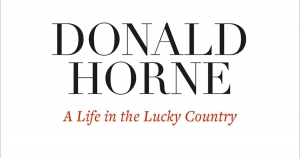Australian Studies
Tom Wright reviews 'Donald Horne: A life in the lucky country' by Ryan Cropp
Here we are again, luck ringing over the land. Ryan Cropp’s new examination of the life and work of Donald Horne (1921–2005) comes out as we resume unpicking the gordian knot of what exactly is Australia. As Cropp observes, it has become impossible to describe this nation without the word luck, as if a continent rolls dice. It is the language of gamblers, of the complacent. It wasn’t introduced by Horne – any survey of the country’s newspapers will find Australia panegyrised or dismissed for riding its luck, but with the publication of The Lucky Country in 1964 Horne caught a truth in a sentence: ‘Australia is a lucky country run by second-rate people who share its luck.’ It was Horne’s personal stroke of luck, changing him as it changed his country. In later years, when Horne became one of those people who ran the place, had Donald joined the second-raters, sharing the spoils of chance?
... (read more)Robert Phiddian reviews 'The Idea of Australia: A search for the soul of the nation' by Julianne Schultz
A new monarch succeeded the day I sat down to write this review about the idea of Australia. Prime Minister Albanese, in a blessedly unpoliticised speech about Elizabeth II’s death, was direct in announcing that he and the governor-general would be heading to London, ‘where we will meet the king’.
... (read more)Joan Beaumont on Australian Studies at Harvard | The ABR Podcast #102
The Gough Whitlam and Malcom Fraser Chair of Australian Studies was established at Harvard University in 1976 as a diplomatic gift marking the bicentenary of the American Revolution. It was also part of a global strategic initiative that saw Australian Studies visiting professorships spring up in places from Dublin and Copenhagen to Tokyo and Beijing. While not all such professorships have fared equally well, the Harvard Chair of Australian Studies has been bolstered by the financial largesse of its host institution as well as by its record of strong recruitment. In this episode of The ABR Podcast, Joan Beaumont reflects on the history of this unique institutional arrangement ...
... (read more)David Trigger reviews 'Finding the Heart of the Nation: The journey of the Uluru Statement towards voice, treaty and truth' by Thomas Mayor
The ‘Uluru Statement from the Heart’ emerged in May 2017 from a convention held in Arrernte country in Central Australia attended by 250 Aboriginal and Torres Strait Islander people from around the nation. The Statement called for a ‘First Nations Voice’ to be enshrined in the Constitution enabling, in general terms, a process of influence on future legislation and policy affecting Indigenous communities. The Statement also seeks a commitment to agreement-making between government and Indigenous groups and ‘truth-telling’ about the history of colonisation.
... (read more)Richard J. Martin reviews The Colonial Fantasy: Why white Australia can’t solve black problems by Sarah Maddison
‘Fuck Australia, I hope it fucking burns to the ground.’ Sarah Maddison opens this book by quoting Tarneen Onus-Williams, the young Indigenous activist who sparked a brief controversy when her inflammatory comments about ...
... (read more)Jen Webb reviews 'The Drover’s Wives: 99 reinterpretations of Henry Lawson’s Australian Classic' by Ryan O’Neill
‘The Drover’s Wife’ was one of the first stories I read when I arrived in Australia. I was living in the bush then, in hard beautiful country, and though my difficulties were First World Problems I shared the Wife’s nostalgia for nights in comfortable hotels, reliable transport, medical services. I did admire the story, though its ...
... (read more)'How do we live with ourselves? The Australian national conscience' by Alan Atkinson
When Australian federation was being planned and its implications first worked through, various men and women with agendas of their own set themselves ...
... (read more)Hector Crawford is a unique figure in the history of Australian radio and television. The Australian Dictionary of Biography article (also by the author of this book) describes him as 'television producer, media lobbyist and musician', to which could be added radio producer, showman, and entrepreneur. Above all, he was a persistent and canny advocate of Aus ...
Peter Hill reviews 'Australian Artists in the Contemporary Museum' by Jennifer Barrett and Jacqueline Millner
I like a book jacket that tells you clearly, in words and images, what it is about. Australian Artists in the Contemporary Museum does just that: ‘The authors’ central argument is that artists’ engagement with the museum has shifted from politically motivated critique taking place in museums of fine art, towards interventions taking place in non-art mus ...
Alan Atkinson reviews 'Settler Society in the Australian Colonies' by Angela Woollacott
Free settlement in Australia from 1788 to the 1850s is an old and favourite topic for historians in this country. It has engaged historical imagination for nearly two centuries, starting with William Charles Wentworth’s A Statistical, Historical, and Political Description of the Colony ...









